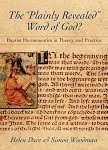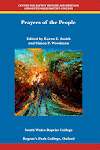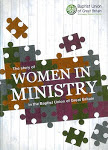A Sermon for Bloomsbury Central Baptist Church
30th July 2023
Photo by Alex Shute on Unsplash
Who, I wonder, is the wisest person you’ve ever met?
I won’t ask you to name them, but it’s worth a thought…
And who, I wonder, is the most foolish person you’ve ever met?
As we continue our journey this week
through the wisdom literature of the Hebrew Bible,
we are introduced to a wise woman,
the Woman Wisdom
and if we were to read the chapters before and after our reading for today,
we would find that she is contrasted
with another woman, whose name is Folly (see Proverbs 9.13-18).
The setup here is that the book of Proverbs
is offering its sage advice to a young man,
and it sets up these two female characters, Wisdom and Folly,
who ply him with their words of perception and foolishness.
His task is to learn to listen to Wisdom
and to reject the wiles of Folly.
So, let’s just name this for what it is:
It’s a highly gender-laden construct,
that reflects the patriarchal culture in which it was written.
The image of female seductress, set on leading young men astray,
is as ancient as patriarchy
and as contemporary as workplace sexism.
The seductress archetype is present in film and literature,
from Scarlett O’Hara,[1] to Mrs Robinson,[2] to Jessica Rabbit,[3]
from Circe[4] to the Sirens,[5] to Lilith,[6] to Eve,[7]
there are no shortage of examples
of women cast as the femme fatale
with the sole intention of leading young men astray.
And I’m afraid, the juxtaposing of Woman Wisdom with Dame Folly
is, at one level, just another example of this trope.
And those of us who come to this text with post #MeToo concerns,
about the abuse that arises from gendered objectification and vilification,
are right to be concerned about what we find here.
It’s a problematic text, and we need to own that.
Ancient literature poses its challenges when read in the modern world.
But then again, it’s given us an opportunity
to talk about this important stuff in a sermon on a Sunday,
so maybe some good can come
from our engagement with it after all.
Anyway, I’ll plough on, and let’s see what else we can unearth…
Our readings today invite us to focus on Woman Wisdom,
who, in contrast to Folly, is a powerful and empowering woman.
Like Folly, she too is the product of a tradition,
which dates back into ancient mythology.
The Egyptians worshipped the Goddess Nut,
the goddess of the sky, the stars, and the cosmos,
often depicted as a star-covered woman
arching over the Earth.[8]
Other cultures contemporary with ancient Israel
also worshipped female deities of great power,
including Ishtar, sometimes called Inanna or Ashera,
the Mesopotamian and Assyrian Queen of Heaven
who gets occasional mentions in the Hebrew Bible.[9]
And it’s in this wider cultural context,
of female deities deeply associated with the created order,
with the sky, the heaven, and the earth,
that the Hebrew Bible offers us Woman Wisdom.
And she, too, is presented
as embodying creation.
Those living in the ancient worlds of Egypt, Israel, and Mesopotamia,
viewed their lives as participating in a great created order,
a great living harmony of all things.[10]
So, for these ancient theologies,
justice and wisdom were a matter of creating and restoring
a sense of societal, political, economic, and religious order.
Many of these cultures, in fact, have just one or two words
that can mean ‘wisdom’, and ‘justice’, and ‘created order’,
all signifying the ability
to live fittingly in the world.
And so when we meet the Woman Wisdom in Proverbs,
we find that she is described in a way
that echoes the ‘tree of life’ passage from the creation story in Genesis.
Provers 3.18 says that,
‘She is a tree of life to those who embrace her’.
This puts Woman Wisdom
firmly in the category of ancient heavenly goddess,
even though the way she is presented in the text as it has come down to us,
makes it clear that she the pre-eminent aspect of God’s creation,
rather than the agent of creation herself.
Just as Genesis has the Spirit of God brooding over the waters,
summoning creation into being at God’s command,
so Proverbs present the Woman Wisdom
as God’s partner in creation, his female counterpart in birthing the cosmos.
You can see, can’t you, how the ancient tradition
of an ancient cosmic couple:
the male and female consorts of creation,
echoes down through the Hebrew Wisdom tradition
to give us the Woman Wisdom of Proverbs,
God’s creative companion.
But unlike the other ancient Levantine goddesses and creation stories,
which are often violent and violating of the female characters,
the creative act described in Proverbs
is marked by the loving, other-person centredness of the creator.
The Hebrew take on creation
is that it is not violent and destined for destruction,
but that it is declared good by God, and is destined for redemption.
And so when we meet Wisdom personified,
we find that she is busy filling the earth
with creativity, generosity, concern for the other,
and a longing for all of creation to flourish before God.
And so we come to chapter 8 of the book of Proverbs,
where we hear from Woman Wisdom in her own words.
This is one of the longest soliloquies given to a female voice
in the whole of Scripture,
and so it’s worth listening to it carefully.
And Wisdom attributes her origins
to the beginning of God’s creative work:
She says, ‘The Lord created me at the beginning of his work,
the first of his acts of long ago.’ (8.22)
Wisdom, because she was around before creation,
is able to proclaim her expertise,
having witnessed and even enjoyed the events of creation (8.23-31).
The many allusions to the created order in this speech
express her appreciation for the order and fittingness
in all that God has made.
But she also keeps making the point
that the world was created with order, with boundaries,
to keep the waters in their place, the land in its place, and so on, (esp. 8.27-29)
and whilst at one level this probably expresses the fear all humans have
of the natural world turning against us with flood, fire, or famine,
it is also presented as a theological truth
that there is some deep order built into the world,
and that Wisdom, personified as a woman,
is the key to discerning it.
Wisdom offers us the key to interpreting the world:
its beginnings, its purpose, its shape and direction.
She offers to guide us in walking wisely in this life,
because she already knows the places that God carved out for us.
And here we have to be careful,
because there is a danger that we might conclude from this
that there is some divinely ordained mechanistic path to success,
whereby if we do this, that, or the other, good things will follow.
And for many people, this is exactly what they want from their religion:
this is the way of reading the Bible
that treats it as a book of answers to life’s perplexing questions;
this is the way of approaching God in prayer,
where God gives us perfect insight
into a divinely personalised perfect plan for our lives.
Such religion can quickly become highly controlling,
as those with a vested interest in the status quo,
use the argument that ‘this is how God ordained it’,
to justify their ongoing power and oppression of others.
But this is not to say that there isn’t a deep wisdom
that it is good for us to hear and heed.
There is something profoundly good about learning to live in harmony with creation,
and whilst it doesn’t guarantee our freedom from suffering,
it is nonetheless a wisdom worth seeking.
Last week I quoted from The Lion, The Witch, and The Wardrobe,
which I found out this week is going to be
the Bloomsbury book group book for next month!
And I’d like to return to it again this week,
to see how C.S. Lewis explains this idea of deep wisdom
or deep magic, as he refers to it.
In the world of Narnia, the Deep Magic refers to a set of laws
placed into Narnia at the time of its creation
by the Emperor-beyond-the-Sea.
These laws were inscribed on the Stone Table,
on which Aslan will eventually be sacrificed.
The law stated that the White Witch, Jadis,
was entitled to kill every traitor,
and that if she was denied this right,
all of Narnia would be "overturned and perish in fire and water".
However, we find out that unknown to Jadis,
a deeper magic from before the dawn of Time existed,
which said that if a willing victim who had committed no treachery
was killed in a traitor's stead,
the Stone Table would crack,
and Death itself would start working backwards.
And so when Jadis made a claim on Edmund Pevensie's life,
Aslan used this Deeper Magic to save him,
at the cost of his own life.
This idea that there is deep wisdom written into the cosmos
invites us to listen carefully to creation,
and the groaning of creation in response to the climate crisis,
is something that humanity needs to hear and hear urgently.
But this applies to us on a personal level,
as well as corporately.
Many voices in the Christian tradition portray life
as a dangerous tightrope,
a straight-and-narrow line where we dare not misstep.
But the Woman Wisdom testifies to the harmony and order
that can be seen in a large and open landscape
She points us to a freedom within form,
to a way of living where each day is a new adventure,
to be explored joyfully with wisdom as our map.
The reduction of religion to rules and regulations,
is the opposite of what is in view here.
Woman Wisdom’s response to her experience of creation,
humanity, and the order of God’s world emphasises joy.
The end of the passage leaves us with three key images:
Firstly, that God delights in her,
Secondly, that she dances before him,
and Thirdly, that she delights in humanity.
The whole poem is full of love, compassion,
intimacy, and exuberant joy and playfulness.
Cosmic wisdom assures us that the good life
is one of joy, and of love for creation.
And this is the message that Wisdom shouts aloud,
raising her voice on the heights, beside the way,
at the crossroads,
beside the gates in front of the town (8.2-3).
This wisdom is not for the holy elect, or the faithful few,
it is wisdom which is good news for all,
and if I were to sum it up, I think what it boils down to,
is the message that God is love, and that God loves us.
And those who respond to God’s love
by living according to the grain of creation,
are those who embody the wisdom of God.
And as we saw last week,
the key to such wise and harmonious living
is life lived in the light of what God has already done for us.
Wisdom is an invitation to alternate our gaze
between God and God’s creation,
living simply, that others might simply live,
loving God with all our heart, mind, soul, and strength,
and loving our neighbour as we love ourselves.
It’s no coincidence that within the Christian tradition,
the image of wisdom personified
becomes fused with the eternal Word made flesh.
And so, to conclude, let us hear from that great gospel of Wisdom,
John’s prologue.
In the beginning was the Word,
and the Word was with God, and the Word was God.
2 He was in the beginning with God.
3 All things came into being through him,
and without him not one thing came into being.
What has come into being 4 in him was life,
and the life was the light of all people.
5 The light shines in the darkness,
and the darkness did not overtake it.
Amen.
[1] https://en.wikipedia.org/wiki/Scarlett_O%27Hara
[2] https://en.wikipedia.org/wiki/The_Graduate
[3] https://en.wikipedia.org/wiki/Jessica_Rabbit
[4] https://en.wikipedia.org/wiki/Circe
[5] https://en.wikipedia.org/wiki/Siren_(mythology)
[6] https://en.wikipedia.org/wiki/Lilith
[7] https://en.wikipedia.org/wiki/Eve
[8] https://en.wikipedia.org/wiki/Nut_(goddess)
[9] https://en.wikipedia.org/wiki/Queen_of_Heaven_(antiquity)
[10] The following draws from Bartholomew and O’Dowd, ‘Old Testament Wisdom Literature: A Theological Introduction’. pp.86ff















